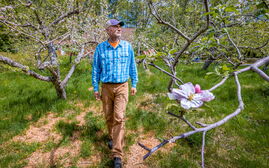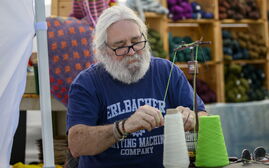Processing Your Payment
Please do not leave this page until complete. This can take a few moments.
- News
-
Editions
-
- Lists
-
Viewpoints
-
Our Events
-
Event Info
- Women's Leadership Forum 2025
- On the Road with Mainebiz in Bethel
- Health Care Forum 2025
- On The Road with Mainebiz in Greenville
- On The Road with Mainebiz in Waterville
- Small Business Forum 2025
- Outstanding Women in Business Reception 2025
- On The Road with Mainebiz in Bath
- 60 Ideas in 60 Minutes Portland 2025
- 40 Under 40 Awards Reception 2025
- On The Road with Mainebiz in Lewiston / Auburn
- 60 Ideas in 60 Minutes Bangor 2025
Award Honorees
- 2025 Business Leaders of the Year
- 2024 Women to Watch Honorees
- 2024 Business Leaders of the Year
- 2023 NextUp: 40 Under 40 Honorees
- 2023 Women to Watch Honorees
- 2023 Business Leaders of the Year
- 2022 NextUp: 40 Under 40 Honorees
- 2022 Women to Watch Honorees
- 2022 Business Leaders of the Year
-
-
Calendar
-
Biz Marketplace
- News
-
Editions
View Digital Editions
Biweekly Issues
- April 21, 2025 Edition
- April 7, 2025
- March 24, 2025
- March 10, 2025
- Feb. 24, 2025
- Feb. 10, 2025
- + More
Special Editions
- Lists
- Viewpoints
-
Our Events
Event Info
- View all Events
- Women's Leadership Forum 2025
- On the Road with Mainebiz in Bethel
- Health Care Forum 2025
- On The Road with Mainebiz in Greenville
- On The Road with Mainebiz in Waterville
- + More
Award Honorees
- 2025 Business Leaders of the Year
- 2024 Women to Watch Honorees
- 2024 Business Leaders of the Year
- 2023 NextUp: 40 Under 40 Honorees
- 2023 Women to Watch Honorees
- 2023 Business Leaders of the Year
- + More
- 2022 NextUp: 40 Under 40 Honorees
- 2022 Women to Watch Honorees
- 2022 Business Leaders of the Year
- Nomination Forms
- Calendar
- Biz Marketplace
Pandemic may mean bleak season for Maine's longstanding agricultural fairs
 FILE PHOTO / Peter Van Allen
The Common Ground Country Fair, where this post-and-beam building demonstration was held, is back to being a live event this year.
FILE PHOTO / Peter Van Allen
The Common Ground Country Fair, where this post-and-beam building demonstration was held, is back to being a live event this year.
More Information
Maine’s agricultural fairs — the traditional festivals of farming, commerce and community that in some seasons together draw nearly 1 million attendees — may have a bitter harvest this fall.
The Common Ground Country Fair, scheduled for Sept. 25-27 in Unity, on Tuesday said it is canceling this year’s event because of coronavirus concerns. A “virtual fair” may take its place, according to a website post by Common Ground’s organizer, the Maine Organic Farmers and Gardeners Association, but the group did not provide details.
“Our decision about the fair was not taken lightly and is the product of feedback from our community, direction from our state’s administration and facts from the Centers for Disease Control and Prevention,” MOFGA said in the post.
The fair typically attracts 50,000 to 60,000 attendees, who come for agricultural demonstrations, talks, livestock shows, carnival rides, music performances and other activities. Then there are the vendors and exhibitors displaying their wares; last year, 160 farms, businesses and organizations participated in the fair.
“We recognize the important role the fair plays in connecting with each other, sharing knowledge, supporting our local economy, creating access to organic food, and extending MOFGA’s year-round work,” MOFGA said.
Common Ground isn’t the only Maine fair changing plans in response to the pandemic and restrictions by Gov. Janet Mills on large public gatherings.
Eleven of the state’s 25 agricultural fairs have now canceled their plans this year, according to the Maine Association of Agricultural Fairs.
Others, including the Bangor State Fair, Cumberland Fair and Fryeburg Fair, are “continuing to evaluate the situation following guidelines as set forward by the Maine CDC and the Office of the Governor,” the association said in a news release Saturday.
Agricultural fairs in Maine run from July to October and have long been a staple in the life of many rural areas. The oldest fair in Maine, the Skowhegan State Fair, is also the oldest in the U.S., dating to 1818. Fryeburg, which was first held in 1851, is one of the most heavily attended fairs, usually drawing around 300,000 visitors.
Both the Skowhegan (Aug. 13-22) and Fryeburg (Oct. 4-11) events are still tentatively scheduled to take place, although Fryeburg Fair organizers say they’ll make a decision about this in early June.
In 2006, Maine's agricultural fairs drew 850,000 paid attendees, 20,000 livestock heads, and 21,000 agricultural exhibits, according to the Houlton Agricultural Fair website.
Maine agricultural fair plans
The following fairs have been canceled for 2020 but plan to resume next year, according to the Maine Association of Agricultural Fairs:
- Acton Fair
- Common Ground Country Fair
- Harmony Free Fair
- Houlton Agricultural Fair
- Litchfield Fair
- Monmouth Fair
- Northern Maine Fair
- Ossipee Valley Fair
- Topsham Fair
- Waterford World’s Fair
- Windsor Fair
The following fairs are tentatively scheduled to take place this year, but are monitoring public health developments and may change plans:
- Bangor State Fair
- Blue Hill Fair
- Clinton Lions Fair
- Cumberland Fair
- Farmington Fair
- Fryeburg Fair
- Maine Farm Days
- Oxford County Fair
- Piscataquis Valley Fair
- Pittston Fair
- Skowhegan Fair
- Springfield Fair
- Union Fair/Maine Wild Blueberry Festival














0 Comments